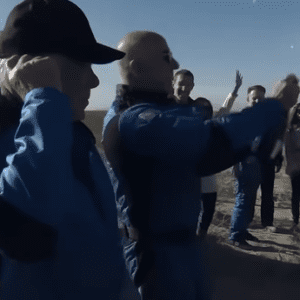
I inherited land that had been leased out, as my attorney recommended I went to go see the land and talk with the lessee. I found three manufactured homes, two of which were obviously abandoned, a shed, a barn, and a four vehicle car port.
The whole place was a mess. The lessee told me he had no intent to renew the lease and he moved out leaving all three home and buildings left standing. The one home was repossessed and I had the others hauled off along with several junk cars and boats.
I then sued him for costs and damages and won. He lost the appeal also. He had put in a well that I had to have registered and tested. I then sold the property to a neighbor who told me the lessee told everybody he had bought the property and of all the goings-on that had occurred there which as often as not involved law enforcement.
The new owner eventually found an old boat buried in the brush and another abandoned shed which had collapsed.
I had this happen on ranch land in Montana. The 500 acre land was being leased to a company in Japan. They built a big log cabin on the far end.
The lease agreement says they have to restore the land to its previous state at the end of the lease. They removed the log cabin and sold it.
I thought they were going to call me and ask if they can leave it, but nope. They follow the lease agreement to the letter and got rid of it. I would have bought it if I had known they’re just going to sell it. It was a really cool cabin.
But to answer your question, they have to put the land back to the way it was and get rid of the house. Or they can do a deal with you to see if you’ll buy it so they don’t have to get rid of it.
If you didn’t buy it and they abandoned it, you’ll have to take them to civil court to recover the cost you paid to get rid of the house. There’s a whole other thing that goes on to show they abandoned it.
This happens more often than you might think. In the UK, for instance, land owners resist selling land which has been in their family for centuries, but it is common for tenants to lease land for 99 years and then build a house on it. What happens at the end of 99 years is that, either the lease is renewed (which happens a lot although the original parties are long dead), or the house reverts to the landlord. He can then lease the land and the house to someone else.
Some of these 99 year leases have been renewed many times over the centuries, but the key issue is that the house is considered a “fixture” (i.e. it is fixed to the land) and thus it runs with the land, not the tenant. The tenant leaves it behind when he goes.
In Canada the land on First Nations reserves cannot be sold, but it can be leased. It is common for First Nations in or near major cities, to lease the land to people who are not band members, for 40 years (which is rather common in Canada because Canada never had Indian wars or relocated its native people like the US and they are sitting on some pretty valuable real estate).
The thing is that 40 year leases do expire after 40 years, and the average house lasts 100 years. Thus at the end of the lease the First Nations get a nice house which is good for another 60 years. The alternative is that the tenant has to negotiate a new lease, which is usually much more expensive than the original one since it comes with a nice house to live in.
These lease negotiations do come as a complete shock for people who thought they owned these ritzy houses in places like Vancouver. They end up having to pay a much higher rent for a house they foolishly assumed they owned.






